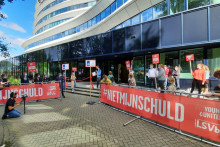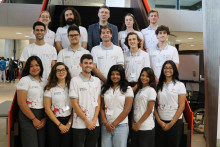The conspiracy theories grow wildly on the internet. The Pentagon is supposed to have been hit by a small military aircraft or a rocket instead of a passenger plane: images of the time of impact are nonexistent and the hole is too small. The collapse of the WTC buildings shouldn't have been possible without additional explosives - and how were they smuggled in? The US government supposedly organised the attacks itself to have an excuse for the war in Afghanistan and Iraq.
The conspiracy theorists give a lot of these technical arguments. Some of them were checked against reality by the students. They spoke to experts and made their own technical analysis. According to the review there were no bombs necessary for the destruction of the Twin Towers and the damage inflicted on the Pentagon fits the explanation of the US government.
A striking presence last Tuesday at the Studium Generale in Delft was American Jimmy Walter, who doesn't believe the explanation of the US government. He promised a reward of one million euros to the person who could scientifically prove the explanations of the US government, convinced that it is impossible. 'He was not very pleased with our presentation', says Coen Vermeeren, head of the Delft SG. Vermeeren looks back on the summer exercise satisfactorily, in spite of all the commotion. 'We found that most of the arguments of the conspiracy theories make no sense. That doesn't mean there is no conspiracy at all. We couldn't find enough information on some things to give a founded conclusion.'
The plot supporters will take no heed of the Delft study because of this. A lot of information is not accessible or controllable and thus the 'students had to work on assumptions for some points', according to a press statement of the TUD.







